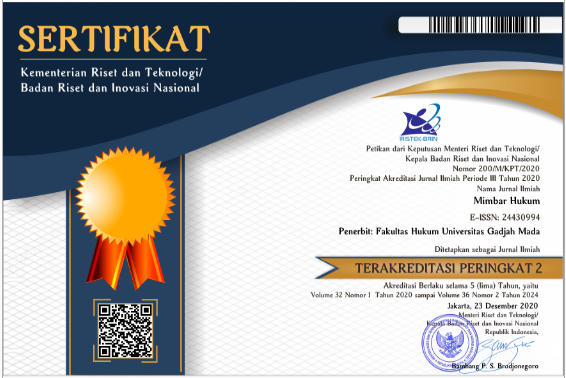IMPROVING OUTSOURCING SYSTEM IN INDONESIA: FIXING THE GAP OF LABOUR REGULATION
Nabiyla Risfa Izzati(1*)
(1) Universitas Gadjah Mada
(*) Corresponding Author
Abstract
Abstract
Outsourcing is always been one crucial issues in Indonesian labour law. Since this system legalized by Law Number 13 Year 2003 on Manpower, there has been a lot of resistance from workers and unions, because outsourcing system is considered detrimental to the position of workers. However, does abolishing outsourcing system the best solution? This research will trace the history of Indonesia's outsourcing system, the advantages and disadvantages of this system, and some possible ways to improve the system. By improving outsourcing system within the legal framework and its implementation, it is not impossible that this system will bring benefits to both workers and employers.
Intisari
Outsourcing atau alih daya merupakan salah satu permasalahan yang krusial dalam ranah hukum ketenagakerjaan di Indonesia. Sejak awal model hubungan kerja ini dilegalkan oleh Undang-Undang Nomor 13 Tahun 2003 tentang Ketenagakerjaan, muncul banyak perlawanan dan resistensi dari kalangan pekerja dan serikat pekerja karena dianggap merugikan posisi pekerja. Namun, apakah menghapuskan sistem outsourcing merupakan solusi? Penelitian ini akan menelusuri sejarah sistem outsourcing Indonesia, kelamahan dan kelebihan sistem ini, serta cara yang mungkin dilakukan untuk memperbaiki sistem ini. Dengan memperbaiki sistem outsourcing dalam kerangka hukum dan pelaksanaan, bukan tidak mungkin sistem ini justru membawa kemanfaatan bagi pekerja maupun pengusaha.
Keywords
Full Text:
PDFReferences
A. Books
Yasar, Iftida, 2012, Outsourcing Tidak Akan Pernah Bisa Dihapus, Pelita Fikir Indonesia, Jakarta.
Saptorini, Indah and Suryomenggolo, Jafar, 2007, Kekuatan Sosial Serikat Buruh: Putaran Baru dalam Perjuangan Menolak Outsourcing, Trade Union Rights Centre, Jakarta.
Tjandraningsih, Indrasari, et al., 2012, Diskriminatif and Eksploitatif: Praktek Kerja Kontrak dan Outsourcing Buruh di Sektor Industri Metal di Indonesia, AKATIGA, Bandung.
Herawati, Rina, 2010, Kontrak dan Outsourcing Harus Makin Diwaspadai, Yayasan AKATIGA, Jakarta.
B. InternetWanandi, Sofjan, “Global Business Guide Indonesia: Solutions for the Outsourcing System in Indonesia”, http://www.gbgindonesia.com/en/main/partners_updates/apindo/solutions_for_the_outsourcing_system_in_indonesia.php, accessed on 5 October 2017.
C. Journal ArticlesJuliawan, Benny Hari, “Extracting Labour From Its Owner: Private Employment Agencies and Labour Market Flexibility in Indonesia”, Critical Asian Studies, 26 Februari 2010.
D. Research ReportHartmann, Thomas, 2012, Temporary Agency Work in Germany and the Netherlands, Thesis, Tilburg University, Tilburg.
Heins, Bernd, 2004, The Role of Labour Unions in the Process Towards Sustainable Consumption and Production, Final Report to the United Nations Environment Programme, Paris.
E. RegulationsLaw Number 13 of 2003 concerning Manpower Affairs (State Gazette of the Republic of Indonesia Number 39 Year 2003, Supplement to State Gazette of the Republic of Indonesia No. 4279).
Ministerial Regulation Number 19 of 2012 concerning The Requirements of Outsourcing.
Article Metrics
Refbacks
- There are currently no refbacks.
Copyright (c) 2017 Nabiyla Risfa Izzati

This work is licensed under a Creative Commons Attribution 4.0 International License.



























